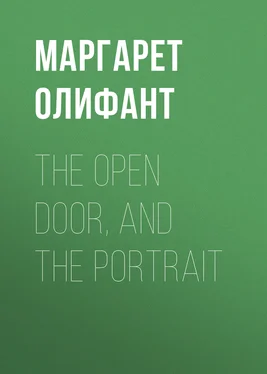Маргарет Олифант - The Open Door, and the Portrait
Здесь есть возможность читать онлайн «Маргарет Олифант - The Open Door, and the Portrait» — ознакомительный отрывок электронной книги совершенно бесплатно, а после прочтения отрывка купить полную версию. В некоторых случаях можно слушать аудио, скачать через торрент в формате fb2 и присутствует краткое содержание. Жанр: foreign_prose, literature_19, foreign_antique, на английском языке. Описание произведения, (предисловие) а так же отзывы посетителей доступны на портале библиотеки ЛибКат.
- Название:The Open Door, and the Portrait
- Автор:
- Жанр:
- Год:неизвестен
- ISBN:нет данных
- Рейтинг книги:4 / 5. Голосов: 1
-
Избранное:Добавить в избранное
- Отзывы:
-
Ваша оценка:
- 80
- 1
- 2
- 3
- 4
- 5
The Open Door, and the Portrait: краткое содержание, описание и аннотация
Предлагаем к чтению аннотацию, описание, краткое содержание или предисловие (зависит от того, что написал сам автор книги «The Open Door, and the Portrait»). Если вы не нашли необходимую информацию о книге — напишите в комментариях, мы постараемся отыскать её.
The Open Door, and the Portrait — читать онлайн ознакомительный отрывок
Ниже представлен текст книги, разбитый по страницам. Система сохранения места последней прочитанной страницы, позволяет с удобством читать онлайн бесплатно книгу «The Open Door, and the Portrait», без необходимости каждый раз заново искать на чём Вы остановились. Поставьте закладку, и сможете в любой момент перейти на страницу, на которой закончили чтение.
Интервал:
Закладка:
“Yes, yes, my boy, I know. But you are ill, and quiet is so necessary. You are not only not a fool, Roland, but you are reasonable and understand. When you are ill you must deny yourself; you must not do everything that you might do being well.”
He waved his thin hand with a sort of indignation. “Then, father, I am not ill,” he cried. “Oh, I thought when you came you would not stop me,—you would see the sense of it! What do you think is the matter with me, all of you? Simson is well enough; but he is only a doctor. What do you think is the matter with me? I am no more ill than you are. A doctor, of course, he thinks you are ill the moment he looks at you—that’s what he’s there for—and claps you into bed.”
“Which is the best place for you at present, my dear boy.”
“I made up my mind,” cried the little fellow, “that I would stand it till you came home. I said to myself, I won’t frighten mother and the girls. But now, father,” he cried, half jumping out of bed, “it’s not illness: it’s a secret.”
His eyes shone so wildly, his face was so swept with strong feeling, that my heart sank within me. It could be nothing but fever that did it, and fever had been so fatal. I got him into my arms to put him back into bed. “Roland,” I said, humoring the poor child, which I knew was the only way, “if you are going to tell me this secret to do any good, you know you must be quite quiet, and not excite yourself. If you excite yourself, I must not let you speak.”
“Yes, father,” said the boy. He was quiet directly, like a man, as if he quite understood. When I had laid him back on his pillow, he looked up at me with that grateful, sweet look with which children, when they are ill, break one’s heart, the water coming into his eyes in his weakness. “I was sure as soon as you were here you would know what to do,” he said.
“To be sure, my boy. Now keep quiet, and tell it all out like a man.” To think I was telling lies to my own child! for I did it only to humor him, thinking, poor little fellow, his brain was wrong.
“Yes, father. Father, there is some one in the park—some one that has been badly used.”
“Hush, my dear; you remember there is to be no excitement. Well, who is this somebody, and who has been ill-using him? We will soon put a stop to that.”
“All,” cried Roland, “but it is not so easy as you think. I don’t know who it is. It is just a cry. Oh, if you could hear it! It gets into my head in my sleep. I heard it as clear—as clear; and they think that I am dreaming, or raving perhaps,” the boy said, with a sort of disdainful smile.
This look of his perplexed me; it was less like fever than I thought. “Are you quite sure you have not dreamed it, Roland?” I said.
“Dreamed?—that!” He was springing up again when he suddenly bethought himself, and lay down flat, with the same sort of smile on his face. “The pony heard it, too,” he said. “She jumped as if she had been shot. If I had not grasped at the reins—for I was frightened, father—”
“No shame to you, my boy,” said I, though I scarcely knew why.
“If I hadn’t held to her like a leech, she’d have pitched me over her head, and never drew breath till we were at the door. Did the pony dream it?” he said, with a soft disdain, yet indulgence for my foolishness. Then he added slowly, “It was only a cry the first time, and all the time before you went away. I wouldn’t tell you, for it was so wretched to be frightened. I thought it might be a hare or a rabbit snared, and I went in the morning and looked; but there was nothing. It was after you went I heard it really first; and this is what he says.” He raised himself on his elbow close to me, and looked me in the face: “‘Oh, mother, let me in! oh, mother, let me in!’” As he said the words a mist came over his face, the mouth quivered, the soft features all melted and changed, and when he had ended these pitiful words, dissolved in a shower of heavy tears.
Was it a hallucination? Was it the fever of the brain? Was it the disordered fancy caused by great bodily weakness? How could I tell? I thought it wisest to accept it as if it were all true.
“This is very touching, Roland,” I said.
“Oh, if you had just heard it, father! I said to myself, if father heard it he would do something; but mamma, you know, she’s given over to Simson, and that fellow’s a doctor, and never thinks of anything but clapping you into bed.”
“We must not blame Simson for being a doctor, Roland.”
“No, no,” said my boy, with delightful toleration and indulgence; “oh, no; that’s the good of him; that’s what he’s for; I know that. But you—you are different; you are just father; and you’ll do something—directly, papa, directly; this very night.”
“Surely,” I said. “No doubt it is some little lost child.”
He gave me a sudden, swift look, investigating my face as though to see whether, after all, this was everything my eminence as “father” came to,—no more than that. Then he got hold of my shoulder, clutching it with his thin hand. “Look here,” he said, with a quiver in his voice; “suppose it wasn’t—living at all!”
“My dear boy, how then could you have heard it?” I said.
He turned away from me with a pettish exclamation,—“As if you didn’t know better than that!”
“Do you want to tell me it is a ghost?” I said.
Roland withdrew his hand; his countenance assumed an aspect of great dignity and gravity; a slight quiver remained about his lips. “Whatever it was—you always said we were not to call names. It was something—in trouble. Oh, father, in terrible trouble!”
“But, my boy,” I said (I was at my wits’ end), “if it was a child that was lost, or any poor human creature—but, Roland, what do you want me to do?”
“I should know if I was you,” said the child eagerly. “That is what I always said to myself,—Father will know. Oh, papa, papa, to have to face it night after night, in such terrible, terrible trouble, and never to be able to do it any good! I don’t want to cry; it’s like a baby, I know; but what can I do else? Out there all by itself in the ruin, and nobody to help it! I can’t bear it! I can’t bear it!” cried my generous boy. And in his weakness he burst out, after many attempts to restrain it, into a great childish fit of sobbing and tears.
I do not know that I ever was in a greater perplexity, in my life; and afterwards, when I thought of it, there was something comic in it too. It is bad enough to find your child’s mind possessed with the conviction that he has seen, or heard, a ghost; but that he should require you to go instantly and help that ghost was the most bewildering experience that had ever come my way. I am a sober man myself, and not superstitious—at least any more than everybody is superstitious. Of course I do not believe in ghosts; but I don’t deny, any more than other people, that there are stories which I cannot pretend to understand. My blood got a sort of chill in my veins at the idea that Roland should be a ghost-seer; for that generally means a hysterical temperament and weak health, and all that men most hate and fear for their children. But that I should take up his ghost and right its wrongs, and save it from its trouble, was such a mission as was enough to confuse any man. I did my best to console my boy without giving any promise of this astonishing kind; but he was too sharp for me: he would have none of my caresses. With sobs breaking in at intervals upon his voice, and the rain-drops hanging on his eyelids, he yet returned to the charge.
“It will be there now!—it will be there all the night! Oh, think, papa,—think if it was me! I can’t rest for thinking of it. Don’t!” he cried, putting away my hand,—“don’t! You go and help it, and mother can take care of me.”
Читать дальшеИнтервал:
Закладка:
Похожие книги на «The Open Door, and the Portrait»
Представляем Вашему вниманию похожие книги на «The Open Door, and the Portrait» списком для выбора. Мы отобрали схожую по названию и смыслу литературу в надежде предоставить читателям больше вариантов отыскать новые, интересные, ещё непрочитанные произведения.
Обсуждение, отзывы о книге «The Open Door, and the Portrait» и просто собственные мнения читателей. Оставьте ваши комментарии, напишите, что Вы думаете о произведении, его смысле или главных героях. Укажите что конкретно понравилось, а что нет, и почему Вы так считаете.












